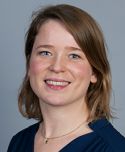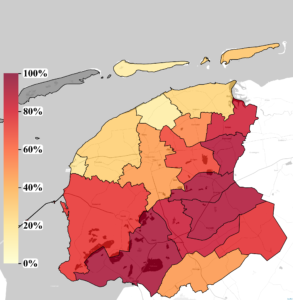Data Science: Frisian is not a standard language

Collecting data for academic research can be a painstaking process. But what if you let the target audience of your research roll up their sleeves? So Nanna Hilton, Professor of Sociolinguistics at the University of Groningen, decided to get her target group to join in with this part of her research. Assisted by 14,000 Frisian-speakers and team Data Science at the Center for Information Technology (CIT) of the UG, she came to some unexpected conclusions in her research into the changing face of the Frisian language.
Author: Jorn Lelong
What is the current state of play with the Frisian language? This is the question that linguist Nanna Hilton from the University of Groningen (UG) wanted to investigate. She comes from Norway, but her background in sociolinguistics aroused her curiosity in the Frisian language.
‘Most sociolinguists are interested in non-standard languages. Although Frisian is a recognized language in the Netherlands, it’s still a minority language. Not all of the Frisian population learn the language as children at home or at school, and even if they do, they also have to learn Dutch. This makes it interesting to study Frisian and see whether, and to what extent, the language moving towards Dutch.’
Time is running out
Frisian people consider their language to be an important part of their identity. For many years, the northerners fought to get their language officially recognized. In 2014, recognition was granted: Frisian became the official ‘second national language’ in the Netherlands. Frisian was also added to Google Translate in an attempt to breathe digital life into the language.
Despite these frantic efforts to cherish it, all the signs seem to indicate that time is running out for Frisian as a language. The Nijmegen linguist Geert Driessen published a sobering report about the state of the Frisian language, known in Dutch as het Fries, in 2016. He concluded that Frisian is being used less and less, both within and outside family situations. According to Driessen, this is because it is no longer automatically passed from parents to children, as is the case with most minority languages. Increased mobility (i.e. increased contact with non-Frisian people) and the growing impact of the English language are also putting Frisian under pressure.
Providing data via an app
Spoken language obviously develops and changes all the time. But if you want to find out whether Frisian is moving towards Dutch or is losing some of its unique features, you need data. Lots of data. So, Nanna Hilton asked the Frisian population for help with her research project ‘Stimmen fan Fryslân’ (Voices from Friesland). Inspired by previous projects that had been carried out in Switzerland and England, she and the UG’s Centre for Digital Humanities developed a user-friendly, interactive app that would enable people to provide data themselves.
Citizen science at its best
There were two ways of doing this. First, users were asked to speak a few words, so that the app could analyse whether the pronunciation fitted the Klaaifrysk, Stadsfries or Stellingwerfs dialect or another variation of the Frisian language.
Secondly, participants were offered a ‘Dialect Quiz’ to show how they pronounce certain words. Take the Dutch word zaterdag (Saturday). In Frisian, do you say sneon, saterje or saterdei? After analysing 19 different words, the app shows the region that corresponds best with the word combinations entered by the user.
A case of mixing business with pleasure. ‘You probably wouldn’t get much response if you just asked users to recite a text that you sent them. You have to give people a reason for taking part, so we decided to offer them a dialect quiz’, says Hilton. This approach worked. Partly thanks to help from Omroep Fryslân and Campus Fryslân (which shared the app), over 15,000 people took part in the project. A highly successful example of citizen science.
Once a Frisian, always a Frisian
Contrary to expectation, Frisian does not seem to have shifted further towards Dutch in the majority of regions. ‘I had expected to see major changes. I really thought that I would be going back to Omroep Fryslân to tell them that something was seriously afoot. Luckily, I didn't have to. People are still choosing Frisian vowels and words, and local variations are still very much alive.’
As users of all ages and from every region were asked to use the app, the data provided a lot of material for comparison. Among other things, Hilton discovered that young people are not necessarily discarding Frisian as a language, but that they do tend to use one particular variation. For example, the standard Frisian form 'yell' for 'geel' (yellow) is making a comeback at the expense of other regional variations. So, the language is definitely changing among young Frisian people, but not in the way that the researcher had expected.

Call for Proposals Data Science: visualizing data
Hilton had not anticipated the huge volume of data that the project generated. She decided to write a research proposal for the annual Call for Proposals issued by the UG’s Center for Information Technology. Once the proposal had been approved, data scientist Herbert Kruitbosch helped her to process the data into distribution maps of the various Frisian accents, which were then posted on the website. ‘This project was only possible thanks to the efforts of the public, so we want to share the results with them too. Analysing data is one thing, but making them visible to a public audience is something entirely different. Herbert was a great help in this respect.’

Voice technology
Hilton would like to see more collaboration between her field and data science in the future. ‘Linguists are keen to find out what our written and spoken language will look like in the future. Will I be able to choose voice technology that uses my Norwegian dialect, for example, or Frisian? This technology is currently being aligned with standard languages throughout the world, despite the fact that most people don’t speak a standard language. So, we need to find ways of using computerized neural networks to integrate language variation into this technology. We linguists still have a lot to learn.’
More information
- CIT Data Science team
- Nanna Hilton
- Stimmen fan Fryslân
More news
-
15 September 2025
Successful visit to the UG by Rector of Institut Teknologi Bandung
